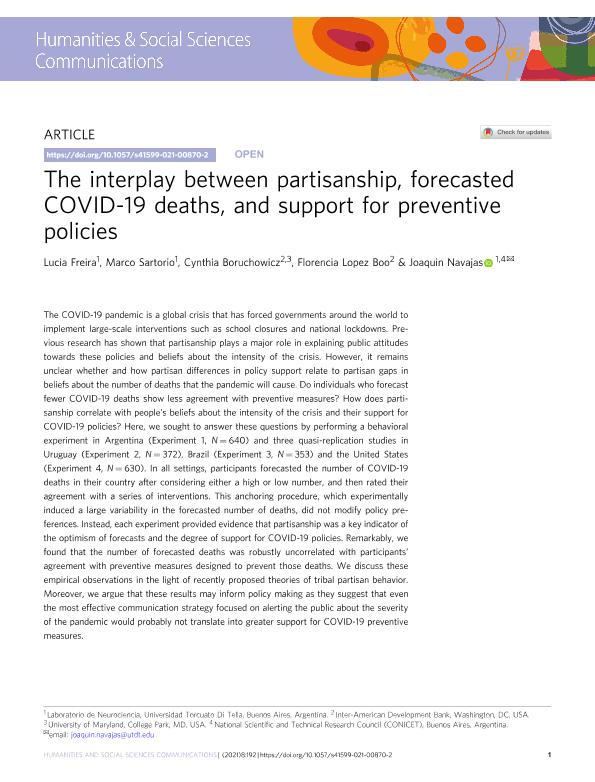Mostrar el registro sencillo del ítem
dc.contributor.author
Freira Polleri, Maria Lucia

dc.contributor.author
Sartorio, Marco
dc.contributor.author
Boruchowicz, Cynthia
dc.contributor.author
Lopez Boo, Florencia
dc.contributor.author
Navajas Ahumada, Joaquin Mariano

dc.date.available
2023-12-14T12:03:25Z
dc.date.issued
2021-08
dc.identifier.citation
Freira Polleri, Maria Lucia; Sartorio, Marco; Boruchowicz, Cynthia; Lopez Boo, Florencia; Navajas Ahumada, Joaquin Mariano; The interplay between partisanship, forecasted COVID-19 deaths, and support for preventive policies; Springer; Humanities and Social Sciences Communications; 8; 1; 8-2021; 1-10
dc.identifier.issn
2662-9992
dc.identifier.uri
http://hdl.handle.net/11336/220287
dc.description.abstract
The COVID-19 pandemic is a global crisis that has forced governments around the world to implement large-scale interventions such as school closures and national lockdowns. Previous research has shown that partisanship plays a major role in explaining public attitudes towards these policies and beliefs about the intensity of the crisis. However, it remains unclear whether and how partisan differences in policy support relate to partisan gaps in beliefs about the number of deaths that the pandemic will cause. Do individuals who forecast fewer COVID-19 deaths show less agreement with preventive measures? How does partisanship correlate with people’s beliefs about the intensity of the crisis and their support for COVID-19 policies? Here, we sought to answer these questions by performing a behavioral experiment in Argentina (Experiment 1, N = 640) and three quasi-replication studies in Uruguay (Experiment 2, N = 372), Brazil (Experiment 3, N = 353) and the United States (Experiment 4, N = 630). In all settings, participants forecasted the number of COVID-19 deaths in their country after considering either a high or low number, and then rated their agreement with a series of interventions. This anchoring procedure, which experimentally induced a large variability in the forecasted number of deaths, did not modify policy preferences. Instead, each experiment provided evidence that partisanship was a key indicator of the optimism of forecasts and the degree of support for COVID-19 policies. Remarkably, we found that the number of forecasted deaths was robustly uncorrelated with participants’ agreement with preventive measures designed to prevent those deaths. We discuss these empirical observations in the light of recently proposed theories of tribal partisan behavior. Moreover, we argue that these results may inform policy making as they suggest that even the most effective communication strategy focused on alerting the public about the severity of the pandemic would probably not translate into greater support for COVID-19 preventive measures.
dc.format
application/pdf
dc.language.iso
eng
dc.publisher
Springer

dc.rights
info:eu-repo/semantics/openAccess
dc.rights.uri
https://creativecommons.org/licenses/by/2.5/ar/
dc.subject
PARTISANSHIP
dc.subject
COVID-19
dc.subject
DEATHS
dc.subject
POLICIES
dc.subject.classification
Otras Psicología

dc.subject.classification
Psicología

dc.subject.classification
CIENCIAS SOCIALES

dc.subject.classification
Otras Ciencia Política

dc.subject.classification
Ciencia Política

dc.subject.classification
CIENCIAS SOCIALES

dc.title
The interplay between partisanship, forecasted COVID-19 deaths, and support for preventive policies
dc.type
info:eu-repo/semantics/article
dc.type
info:ar-repo/semantics/artículo
dc.type
info:eu-repo/semantics/publishedVersion
dc.date.updated
2023-12-12T13:22:34Z
dc.journal.volume
8
dc.journal.number
1
dc.journal.pagination
1-10
dc.journal.pais
Reino Unido

dc.description.fil
Fil: Freira Polleri, Maria Lucia. Universidad Torcuato Di Tella. Escuela de Negocios; Argentina
dc.description.fil
Fil: Sartorio, Marco. Universidad Torcuato Di Tella. Escuela de Negocios; Argentina
dc.description.fil
Fil: Boruchowicz, Cynthia. Banco Interamericano de Desarrollo.; Estados Unidos
dc.description.fil
Fil: Lopez Boo, Florencia. Banco Interamericano de Desarrollo.; Estados Unidos
dc.description.fil
Fil: Navajas Ahumada, Joaquin Mariano. Universidad Torcuato Di Tella. Escuela de Negocios; Argentina. Consejo Nacional de Investigaciones Científicas y Técnicas; Argentina
dc.journal.title
Humanities and Social Sciences Communications
dc.relation.alternativeid
info:eu-repo/semantics/altIdentifier/url/https://www.nature.com/articles/s41599-021-00870-2
dc.relation.alternativeid
info:eu-repo/semantics/altIdentifier/doi/http://dx.doi.org/10.1057/s41599-021-00870-2
Archivos asociados
